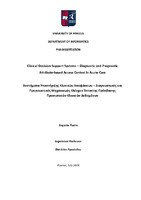Clinical decision support systems – Diagnostic and prognostic attribute-based access control in acute care
Συστήματα υποστήριξης κλινικών αποφάσεων – Διαγνωστικός και προγνωστικός μηχανισμός ελέγχου έκτακτης πρόσβασης προσωπικών κλινικών δεδομένων

Doctoral Thesis
Συγγραφέας
Psarra, Evgenia
Ψαρρά, Ευγενία
Ημερομηνία
2023-07Επιβλέπων
Apostolou, DimitriosΑποστόλου, Δημήτριος
Προβολή/
Λέξεις κλειδιά
Attribute-based access control ; Healthcare data security ; Cloud ; Context-aware security policies ; Context-aware services ; Decision making ; Electronic health records ; Emergency services ; Fuzzy logic ; Health information management ; Medical diagnosis ; Medical information systems ; Acute care ; Data privacy ; Cloud storage ; Context handling ; Complex fuzzy rules ; Personalized access control ; Descriptive analytics ; Descriptive synthesis ; Body mass index ; Blood pressure ; Smoking ; Hypertension ; Sequential health data ; Health records ; Long short term memory ; Machine learning ; Neural networks ; Medical diagnosis ; Medical prognosis ; Private and permissioned blockchain ; Hyperledger fabric blockchain technology ; Smart contacts ; Personalized policies ; Proactive access control ; Artificial neural networksΠερίληψη
Το Σύστημα Υποστήριξης Κλινικών Αποφάσεων (CDSS) είναι μια τεχνολογία πληροφοριών στον τομέα της υγείας, η οποία παρέχει στο ιατρικό προσωπικό, πληροφορίες για τα δεδομένα των ασθενών, για τη βελτίωση της υγειονομικής περίθαλψης. Τα CDSSs αποτελούν ένα σημαντικό τομέα της τεχνητής νοημοσύνης στην ιατρική. Επιπλέον, η ανάγκη αξιόπιστων μέσων για τον έλεγχο της πρόσβασης σε ιατρικά δεδομένα αυξάνεται συνεχώς, καθώς ένας αυξανόμενος αριθμός υπηρεσιών υγειονομικής περίθαλψης παρέχονται ηλεκτρονικά. Σε κρίσιμες καταστάσεις όπου η ζωή του ασθενούς βρίσκεται σε κίνδυνο, πολλοί παράγοντες οι οποίες συμμετέχουν στις υπηρεσίες έκτακτης ανάγκης, θα πρέπει να έχουν δικαίωμα πρόσβασης στα Ηλεκτρονικά Μητρώα Υγείας (EHRs) των ασθενών.
i) Να ενισχύσει το μηχανισμό ABAC με προηγμένους και εξατομικευμένους χειριστές περιεχομένου. Ως εκ τούτου, αυτή η διδακτορική διατριβή επεκτείνει την προαναφερθείσα έρευνα σε σχέση με την ενσωμάτωση ασαφών κανόνων σχετικά με τις μετρήσεις υγείας των ασθενών σε έναν μηχανισμό ABAC ο οποίος παρέχει πρόσβαση σε EHRs εισάγοντας εξατομικευμένους χειριστές περιεχομένου για την καλύτερη αντιμετώπιση καταστάσεων έκτακτης ανάγκης. Πιο συγκεκριμένα, αυτή η έρευνα στοχεύει πρώτον στην εύρεση πιθανών συνδυαστικών μετρήσεων υγείας οι οποίες μπορούν να χαρακτηρίσουν κρίσιμες καταστάσεις. Επιπλέον, στόχος αυτής της έρευνας είναι η αξιολόγηση αυτής της προσέγγισης χρησιμοποιώντας μια διαδικτυακή εφαρμογή ώστε να συγκριθεί με υπάρχοντες απλούστερους μηχανισμούς που μελετήθηκαν σε αυτή τη διατριβή.
ii) Να αναπτύξει και να εφαρμόσει τεχνικές μηχανικής μάθησης, βάσει των ιατρικών μετρήσεων των ασθενών και να τις ενσωματώσει στο μηχανισμό ABAC. Αυτός ο μηχανισμός μπορεί να παραχωρήσει πρόσβαση σε ένα σύστημα ευαίσθητων EHRs εφαρμόζοντας εξατομικευμένους χειριστές περιεχομένου βασισμένοι στη μηχανική μάθηση, οι οποίοι μπορούν να αξιοποιήσουν ακατέργαστη σημασιολογική πληροφορία, π.χ. δεδομένα από συσκευές IoT, έτσι ώστε να εντοπιστούν κρίσιμες ιατρικές καταστάσεις και να παραχωρηθεί πρόσβαση σε ευαίσθητα ιατρικά δεδομένα. Πιο συγκεκριμένα, αυτή η προσέγγιση χρησιμοποιεί το ιστορικό υγείας του ασθενούς προκειμένου να προβλέψει τις ιατρικές μετρήσεις των επόμενων δύο ωρών εφαρμόζοντας Νευρωνικά Δίκτυα Μακροπρόθεσμης Μνήμης (LSTM). Οι τιμές των προβλεπόμενων μετρήσεων υγείας πρέπει να αξιολογηθούν από τους εξατομικευμένους ασαφείς χειριστές περιεχομένου της διατριβής, έτσι ώστε να εκτιμηθεί η κρίσιμη κατάσταση της υγείας του ασθενούς. Επιπρόσθετα, στόχος είναι να αναπτυχθεί μία επαρκής διαδικτυακή εφαρμογή ώστε να αξιολογηθεί αυτή η προσέγγιση και να συγκριθεί με διαφορετικές προηγούμενες προσεγγίσεις της παρούσας διδακτορικής διατριβής.
iii) Τέλος, για να ενεργοποιηθεί ο μηχανισμός προληπτικής δράσης, εφαρμόζονται LSTM νευρωνικά δίκτυα τα οποία χρησιμοποιούν το πρόσφατο ιστορικό υγείας του ασθενούς για να προβλέψουν τις τιμές ιατρικών μετρήσεων εντός των επόμενων δύο ωρών. Η ασαφής λογική χρησιμοποιείται για την αξιολόγηση της κρισιμότητας της κατάστασης της υγείας του ασθενούς. Αυτές οι τεχνικές ενσωματώνονται σε ένα ιδιωτικό και αδειοδοτημένο δίκτυο αλυσίδας συστοιχιών (blockchain) αξιοποιώντας την πλατφόρμα Hyperledger-Fabric, ικανό να διασφαλίζει τις ευαίσθητες πληροφορίες του ασθενούς. Συνολικά, η ενσωμάτωση αυτού του προγνωστικού μηχανισμού στο δίκτυο αλυσίδας συστοιχιών blockchain αποδείχθηκε ένα ισχυρό εργαλείο για τη βελτίωση της απόδοσης του μηχανισμού ελέγχου πρόσβασης. Επιπλέον, το εν λόγω δίκτυο αλυσίδας συστοιχιών blockchain μπορεί να καταγράψει το ιστορικό του ποιος και πότε είχε πρόσβαση στα ευαίσθητα EHRs ενός συγκεκριμένου ασθενούς, διασφαλίζοντας την ακεραιότητα και την ασφάλεια των ιατρικών δεδομένων. Ο προτεινόμενος μηχανισμός ενημερώνει προληπτικά την ομάδα έκτακτης ανάγκης σχετικά κρίσιμες ιατρικές καταστάσεις των ασθενών συνδυάζοντας ασαφείς και προγνωστικές τεχνικές και εκμεταλλεύεται τα κατανεμημένα δεδομένα του δικτύου αλυσίδας συστοιχιών blockchain, διασφαλίζοντας την ακεραιότητα και την ασφάλεια των δεδομένων και ενισχύοντας την εμπιστοσύνη των χρηστών στον εν λόγω μηχανισμό.
vi) Τελευταίο αλλά εξίσου σημαντικό, αυτή η διατριβή αξιοποιεί χειριστές περιεχομένου που βασίζονται σε νευρωνικά δίκτυα για την επίτευξη διαγνωστικού ελέγχου σε ευαίσθητες ιατρικές πληροφορίες και για την εκτίμηση ασθενειών των ασθενών, όπως υπέρταση ή εγκεφαλοαγγειακές παθήσεις, με βάση τις ιατρικές μετρήσεις τους.

